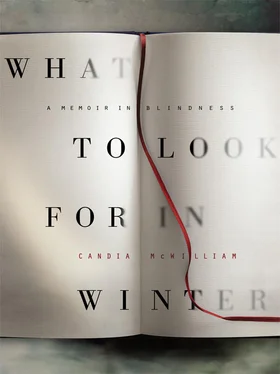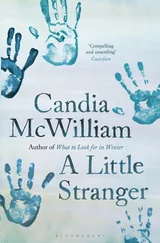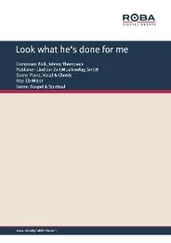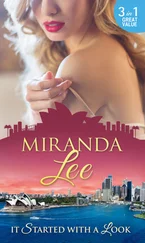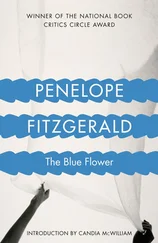I wonder now whether I was ever actually invited at all to Carradale or whether I just hid within one family or another’s capacious kindness: Rowy was kind all through my youth in a sort of improvement on her late friend, my mother’s, way. An improvement, I mean, in that Rowy was alive. Nou’s daughter-in-law Lorna, married to Av (Nicholas Avrion in full, meaning the Victory of the People), came from Skye and always seemed to be carrying a baby in her arms. She never raised her voice and had the balanced selflessness that comes to only very few mothers. She was impossible to lie to. It was Ruth, Naomi’s oldest daughter-in-law, whom I loved and to whom I clung like stickyweed for years, though she never complained about it, even when I started sticking to her in the South as well. She was not a physically large person, nor did she shout. She seemed to see a great deal and to interpret it correctly but in silence. She was a doctor, musical, wore slim brown or grey shirts and sat at a tangent to the table. She was tangential in manner yet direct in thought; a mode I find increasingly appealing the longer I live. I wish she were alive now; hers was a singular note amid so much information and embodied, biological almost, confidence.
At the far end of the dining room was a sizeable brown painting, thickly impastoed. It was known as ‘The Goat in the Custard’, and worked surprisingly well as a splashback for the kippers that were left for each individual to fry for him or herself at breakfast, in a then remarkable item of culinary equipment, an electric frying pan. It is a miracle that the house smelt not of frying red herrings but of heather, wood, pipe smoke and wool. Heather smells like dust and honey both. Intellectuals smoked pipes then.
Sometimes, a piper would come up from Lochgilphead, and, perhaps, a squeezebox player, and we would dance in the library, which was called the ping-pong room. Nou, short, dense, wore garments of fantastic tribal splendour and simultaneous rationality, sandals, bright yet serious skirts and perhaps a serape or sash in acknowledgement of one or another of her encyclopaedic interests and convictions. She was unbending, solid, frowning; she looked like strength itself, like an animal, an armadillo or a Galapagos tortoise; absolutely not a pangolin. The pangolin looks as though his armour has only recently been donned. Nou was born in hers. She danced in a stately manner that attested to her sublime physical confidence. She was an advocate of the benefits of free love. I feared to be addressed by her, yet longed to get a smile from her. I felt easier in her house when she was not in the room and that this is not a particularly healthy state of mind. I do not think that she cared much for my mother or me; even as lame ducks, a class for which Nou had time, we were not interestingly lamed. I can imagine my mother getting Carradale all wrong, talking in the drawing room during the daytime or gossiping or noticing clothes or foods or smells. Certainly she would be overdressed. We were there together only one time, when I was two, so I cannot speak for her outfit during that summer of 1957.
Mealtime conversation was on the whole abstract or theoretical, whatever age you were. There was little people-talk unless it be of use, attached to a paper written, a law made, a proof offered. Avrion had made butter with Lorna’s breast milk, I seem to remember, and there was talk of self-made blood-pudding.
Two years ago, wandering around the Scottish National Portrait Gallery, I came face to face with Nou. There she was, miraculously at about my height, as never in life, dressed in blue, frowning, chin on hand, looking me straight in the eye. It was her portrait by Wyndham Lewis, which had been on the ping-pong room wall and under whose gaze, dancing this time to records of Scottish dance tunes, I fell in love for the first time with a grown human not resident in the ancient world. It is a love that came to nothing in the conventional sense so that it remains, for me at least, complete. Nor is it untried. The one who generated it absolutely without intent remains today a beloved friend and provided for years as it were an internal moral thermostat that I fell short of, but knew when I was doing so. It is not coincidental to my life as a novelist that he was a child in India and is a musical scientist. Nor is it coincidental to my private life.
Wyndham Lewis was a good choice to paint the young Nou. He got that density, that energy, that intellectual force. In the corner of the painting to the sitter’s right is a curious pair of antagonistic marks, written in paint, like scallops inverted, or fists opposed, conjunct yet fierce. If they encrypt Nou’s character, they do it well. The other attribute caught is her uncompromising seriousness, combined with an irresistibility, like that of some metal.
In the long-playing-record trunk in that library, there were also to be found the speeches of V. I. Lenin and a Russian phrase book from which I copied into my diary at that time ‘A rose is a flower. A man loves a woman. Death is inevitable.’ I also found a book on medieval Latin lyric by Helen Waddell and remember the words:
‘Vel confossus pariter
Morerer feliciter,’
that she translates as:
‘Low in the grave with thee
Happy to lie.’
I’ve used these words as soothers for years. They work as phrases whose meaning either dissolves, leaving you in a state of meditation, or tightens up, giving you plenty to think about.
I had discovered a great pleasure of the painful side of life: its relief, or exacerbation, by literature. Of course I’d been doing it all along but hadn’t realised.
It was typically bifocal of me to have lit upon the object of my distant love since his delightful brother was my first proper boyfriend. Between them, they constitute immortal disproof of the proposition that all Mitchisons are brilliant but not always super-subtle. Terence Mitchison was an undergraduate medieval historian at St Catherine’s College, Oxford, a place that was to recur and grow in my life. We met during the famous summer that Anthony Appiah, the grandson of Sir Stafford Cripps and nephew of the Queen of the Ashanti, said, and we were just thirteen, ‘It depends whether you have an eschatological Weltanschauung .’ The thing about Anthony was that he had some paisley flares and a blue rollneck and he could play the piano. The other thing was that we became best friends and that he’s never shown off in his life. He just was that far in front — like Prospero, but kinder.
Terence courted me with letters that would, if anyone knew where they were, constitute the most colourful archive you could wish for, literally. He breathed jokes, mainly of the verbal kind, and sent them to me colour-coded, brown for medieval jokes, green for rural jokes, pink for jokes to do with the history of Empire and so on. And, of course, puns resulted in multicoloured words. It was not that Terence was, as I am, a synaesthete whose synaesthesia is redundant or at any rate useless; he was an etymologist with a grip on detail. So considerable was this grip that when we took a holiday, later in our friendship, on a barge on the Brecon Beacon canal with schoolfriends, Terence had embroidered his Admiral’s cap with the barge’s name, Samuel Whiskers . Everything about Terence was thorough and good. He had embroidered another cap: HMS Leaky .
Which makes that swivel of disloyalty, or whatever it was, in me towards my idol, his older brother, extra mortifying, and I only hope Terence was well shot of his schoolgirl correspondent. At the start, I suspect that I fell, as through a trapdoor, for the blameless older brother for the simple, no doubt tediously biological, reason that he was, and remains, the single individual who has, since my mother and father, been able to carry me. His areas of specialism included blue-green algae and dreams. I used to read books about finite-dimensional vector space and Riemann surfaces to try to make myself appealing to this distinguished ludic individual. When he remarked, glancingly, that he thought blue more becoming than pink, I did as my mother would have and made a stew of woad, or rather Dylon dye, in Strong Navy and bunged all my clothes in. Nothing could have prepared this poor man for cause and its effect upon his silly child-friend.
Читать дальше
